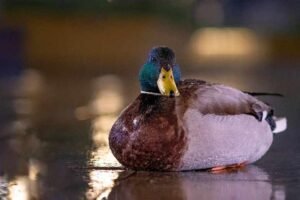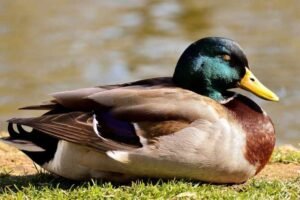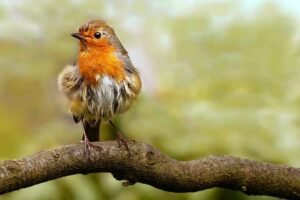Why do blackbirds fledge on the ground? Young blackbirds or fledglings leave their nest before being able to fly. This is the development phase for them, and they spend this time on the ground. During this time, the fledglings learn to be independent. They experiment with foods and understand what is edible by trial and error. This period is crucial in a wing-fluttering fledgling’s life as the bird learns to escape danger and predators that lurk at every nook and corner.
Spring comes with fresh air, colorful flowers, a pleasant atmosphere, and exciting opportunities to observe nature. It is when it’s common to find baby birds walking on the ground or hiding under the bushes. And quite often, it seems like the parent blackbirds have abandoned the baby birds.
Luckily, this isn’t the situation. You might be surprised to learn that blackbird fledglings regularly leave their nest before they can fly. Most of these fledglings can hide from predators quite effectively, so they don’t need any help from humans.
However, if you still want to help the little birdie, keep reading to know whether the baby bird needs a rescue or not.
How to help a Blackbird fledgling on ground?
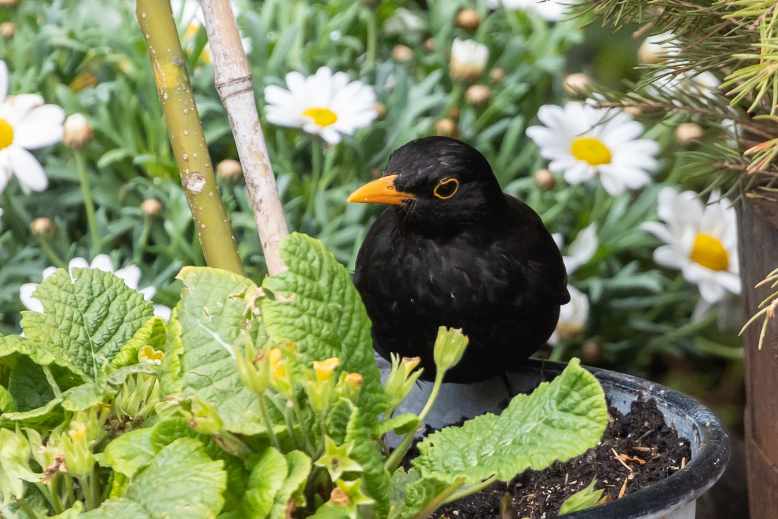
Most birds breed during spring and summer. These are the two seasons when it is normal to find baby birds in the most peculiar of places. Most of these baby birds may seem as if they need help. But before doing anything, first, observe whether the little one has some feathers or not. Feathers determine whether a baby bird is a nestling or a fledgling and if it needs your help. Most people try to “save” fledglings when they don’t need any aid at all.
So, it’s always better to understand what you are dealing with.
Blackbird Nestlings
If the bird has no feathers at all, then it is a nestling. If the nestling is on the ground, it is must be fallen from its nest. Baby birds belong to their nest, but it is not surprising to find one on the floor. Such birds don’t survive long without the protection of their nest and parents. Chicks should be re-nested quickly as they are too young to be out of their nest. These are the birds that need your help!
Blackbird Nestling on the ground
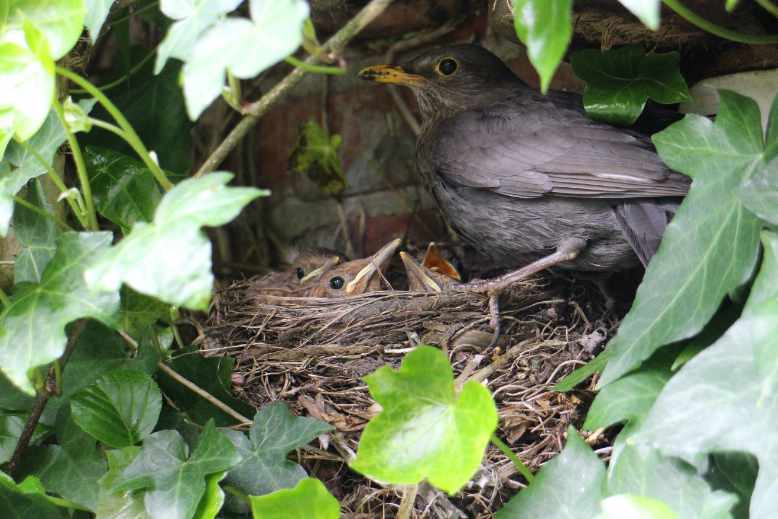
Nestlings are unable to fly. If you spot a nestling, follow these tips to save the bird.
- Injured nestling
If you find an injured baby bird, it’s better to call a wildlife rehabilitation center. They can guide you about the best course of action in your situation.
- Healthy nestling
If the baby you have spotted is healthy, if possible, return it to its nest.
- Locate the nest
If you have spotted a nestling who isn’t shaking, weak, or injured, try to locate the nest. Wear gloves and put the bird back into the nest.
- Surrogate nest
If you cannot locate or reach the original nest, or if the nest is damaged, it’s better to create a surrogate nest.
Make a replacement nest and put the bird back in it. You can use anything to build the nest. It may be a plant pot, a small basket, a plastic container with holes, or a kitchen strainer with some nesting materials.
- Aim for a cereal-bowl-shaped nest.
- Pad the nest with tissues and non-slippery materials.
- Try to fasten the nest closest to the nestling’s original location.
- Make sure the nest is not in the range of any dog or cat.
Parents of nestlings continue to feed them as long as the baby bird is within 10 yards and no human or animal is nearby.
- Monitor the bird
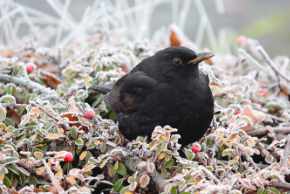
Keep an eye on the bird for a few hours and make sure blackbird parents are here to feed the nestling. If the parent bird doesn’t return, the nestling is probably orphaned. Follow the tips if you feel the nestling is dropped, injured, or ill:
- Secure the baby bird
Use gloved or clean hands to put the bird inside a box padded with a paper towel.
- Keep the nestling warm.
Keep the bird warm by placing a heating pad or a small hot water bowl under half of the box. Try to put the box in a dark and quiet place away from other pets and people.
Make sure you are providing warmth, not heat.
- Get help
Approach a wildlife rehabilitator and try to transport the baby bird to a licensed staff immediately. Hurry up every second count!
Don’t try to put a nestling on a branch. These birds cannot fly and will end up back on the ground soon.
It is suggested not to feed them unless you are a wildlife expert. Nestlings need the right food adequately delivered to them. Wrong food or inexperienced method of feeding can quickly kill the bird.
Let the professionals help with the situation.
Blackbird Fledglings
Fledglings have most or all of their feathers. They are covered in a mix of fuzzy down and adult feathers. These birds are learning to fly and can scramble around. Blackbird fledglings leave their nest as it is part of their natural developmental stage.
It is not unusual to see a fledgling racing on the ground or perching on low branches. These birds continue to develop on the land until they grow stronger and can fly properly. Their parents are usually around. They continue to feed the little one until it’s strong enough to take care of itself. These birds don’t need any help. As long as you feel the chicks are healthy, don’t try to rescue them.
Leave the fledglings alone!
- Blackbird Fledglings on the ground
Blackbird eggs take 13 to 14 days to hatch. Baby birds fledge at 13 to 14 days. However, if the original nest is disturbed, fledglings can leave the nest at nine days old. This early fledging is an anti-predator adaption, and it helps the bird improve its ability to survive. The chicks flutter from the nest and take cover in nearby areas for some days.
During the initial days, fledglings are flightless. But blackbird chicks learn to fly within a week. In the course of this time, they grow their confidence and begin to explore their parents’ empires widely. It takes around two to three weeks for a blackbird fledgling to become utterly independent after leaving the nest.
Blackbirds don’t abandon their fledglings. Young ones are usually under the supervision of a male blackbird while the female bird struggles for the next nesting attempt. The last brood of the season is divided between male and female parents, where each adult takes care of some of the young ones.
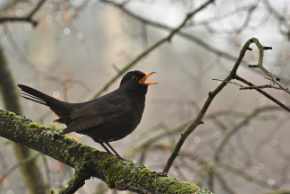
It is not recommended to kidnap a blackbird fledgling. Leave the birds where they are and let the parents take care of them. Your concern makes sense, but holding a fledgling from experiencing the wild will cut its chances of survival in the natural environment. It should only be done as a very last attempt.
However, if the young bird is at a potentially dangerous location, for example, a busy road, there is no harm in moving it to the nearest safe place. Make sure you are leaving the bird at the closest location so the parents can find it.
Don’t worry if you are about to handle a bird and you don’t have any gloves at the very moment. Contrary to common belief, holding a fledgling does not cause parent blackbirds to discard it. Birds have a shallow sense of smell, and they respond differently to human smell.
Healthy Fledgling
If a fledgling is healthy, don’t pick it up. Healthy ones can stand upright. You can clearly see them tucking their wings against their bodies tightly. For more satisfaction, you can try to answer the questions below.
- Does the fledgling have any blood wounds, dropping wings, wet or matted feathers, or legs that cannot bear any weight?
- Is the bird lying on its stomach, side, or back?
- Is there any blood around the nostrils?
- Is the fledgling’s head tilting to either side of its body?
- Is the bird noticeably shivering? Is the fledgling cold to touch?
- Is the bird in an open area and not near any bushes or trees?
- Is there any other animal such as a cat and dog stalking the fledgling?
If any of the answers is yes, try contacting a bird rehabilitation center as quickly as possible. Otherwise, don’t make any “rescue” attempts and let the bird be independent.
How to help a Blackbird fledgling?
If you spot a Blackbird fledgling in your backyard, the best action you can take is to leave it alone. The little birdie may look awkward and helpless to you, but it is a natural state. The parent blackbirds will be nearby hunting for food. However, if the bird is exposed to immediate danger, put it in the nearest sheltered place.
- Don’t raise the bird yourself.
You may feel the bird needs your help, but your “rescue plan” can be a threat to the young bird. Inexperienced handling can lead a delicate creature to the death bed. Even if some birds survive, they can never live in the wild as they have missed the critical lessons from their parents. Such birds won’t be able to know how to find food and how to protect themselves from predators.
- Protect the fledglings from pets and other animals
Well, nature has a dark side. Hunters need to hunt to eat. Thereby all birds are threatened by cats. But fledglings are particularly vulnerable.
Now we are not suggesting that you should remove the bird from outdoors to protect it from predators. But if there is a fledgling on the ground and a predator, like a cat or a dog, is nearby, keep the cat inside until the bird is able to fly away. If the cat is from the neighbors, ask your neighbor to take their cat. If the cat continues to attack, spray it with some water.
- Birds and law
No matter how provoked by the bird’s adorable appearance, you must know that birds are protected by Law. It is illegal to have wild birds under your possession unless you are a licensed wildlife rehabilitator. The only exceptions are pigeons, house sparrows, and European starlings (Non-native species).
Related FAQ
Can a baby blackbird survive without its parents?
Nestlings need constant attention and care. They need to be fed by their mother or by some professional to live. A nestling cannot survive without its mother or the ongoing care of some expert.
Can a blackbird fledgling survive on its own?
Fledglings can’t fly like adult birds, but they can survive on their own. It’s pretty normal for fledglings to be found jumping on the ground as they learn to seek food and fly.
Can I touch a fledgling bird?
It’s better not to stress a fledgling bird. If the bird is injured or is exposed to unsafe circumstances, you can touch the bird and leave it in a safer place. Parent blackbirds will not turn their backs on their fuzzy babies just because you handled them. But it’s better to leave the cute ones alone and keep the pets away.
Can a fledgling eat on its own?
Fledgling is a period when a bird learns to seek food on its own. Parent blackbirds teach their little ones how to eat and survive independently. They observe them from a distance. So it’s better not to assume a fledgling needs your help all the time.
What to feed a fledgling bird?
You can offer anything from live mealworms, earthworms, millet spray to breadcrumbs, moistened but dry dog food, and popped corns. Also, don’t forget to provide a bowl of water for the blackbird to stay hydrated.
Wrapping up
No doubt it is intriguing to rescue a blackbird fledgling just walking around in your backyard. But most of the time, the fledglings aren’t in any trouble at all. Remember, adult blackbirds are more skilled in taking care of their offspring than we will ever be. They might be nearby waiting for you to leave. So, try to avoid interference unless it is critical.

